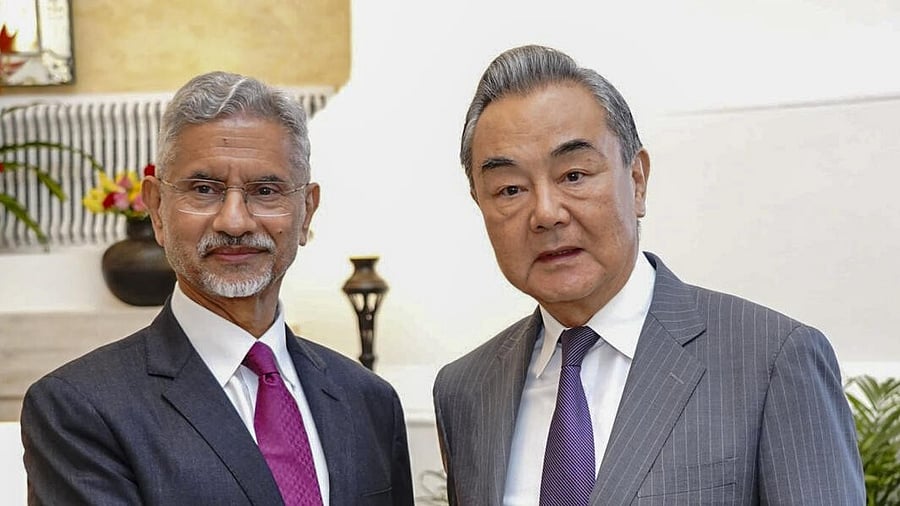
S Jaishankar meets Chinese Foreign Minister.
Credit: PTI photo
New Delhi: Some individuals in India are attempting to undermine China’s sovereignty over Taiwan, Beijing alleged on Thursday, three days after it claimed that New Delhi had broken its silence on the issue.
“It appears that certain individuals in India are attempting to undermine China's sovereignty on the Taiwan issue and sabotage the improvement of China-India relations,” Mao Ning, the spokesperson of the Ministry of Foreign Affairs of the government of China, told journalists in Beijing, adding: “China expresses serious concern and resolute opposition to this.”
Beijing had on Monday quoted India’s External Affairs Minister S Jaishankar saying that Taiwan had been a part of China. New Delhi had later confirmed that the issue of India-Taiwan relations had come up for discussion when Jaishankar had held a meeting with Chinese Foreign Minister Wang Yi in New Delhi.
Jaishankar had noted that India’s position on the issue of Taiwan had not changed. He had conveyed to Wang that India, like the rest of the world, had maintained a relationship with Taiwan focused on economic, technological and cultural ties and that it would continue. New Delhi had underlined that even China cooperated with Taiwan on these domains.
“China is surprised by India's so-called clarification. This is inconsistent with the facts,” Mao told journalists in Beijing on Thursday.
New Delhi had earlier routinely reaffirmed its “One-China” policy in its joint statements with Beijing. But it had stopped doing so after 2008, in response to China’s policy of issuing ‘stapled visas’ to the residents of Jammu and Kashmir, Ladakh and Arunachal Pradesh, instead of normal visas pasted on passports issued by the Government of India.
China had used the ‘stapled visas’ to assert its claims over territories of India.
Prime Minister Narendra Modi’s government, however, had in July 2018 indirectly reaffirmed its adherence to the “One-China policy” and made Air India replace “Taiwan” with “Chinese Taipei” in the list of destinations on its website. Taiwan had strongly reacted, stating that the move by Air India could be seen as India “succumbing to the unreasonable and absurd pressure from China.
Jaishankar’s comment on India’s relations with Taiwan during his meeting with Wang had almost broken New Delhi’s 17-year-long silence on the One-China policy.
The One-China policy recognises only the People's Republic of China, which came into existence in 1949 after the communists defeated the nationalists in the civil war of China. It does not recognise the existence of Taiwan (or the Republic of China), where the nationalists retreated to and based the seat of their government after losing to the communists.
India, like most other nations, has been adhering to the One-China policy since 1949, recognising only the People's Republic of China. That is why India and Taiwan do not have formal diplomatic and consular missions in their respective countries.
The India-Taipei Association, which is headed by a diplomat, functions as New Delhi’s de facto diplomatic and consular mission of India in the capital of Taiwan. The Taipei Economic and Cultural Centre (TECC) in New Delhi similarly serves as the de facto diplomatic and consular mission of Taiwan, officially the Republic of China (RoC), in the capital of India. A TECC was also set up in Chennai in 2012.
Taiwan is keen to expand its quasi-diplomatic presence in India, where many of its technology companies want to set up manufacturing bases in the wake of its escalating tension with China. A new TECC was set up in Mumbai in 2024 despite protests from Beijing.
“I want to emphasise that there is only one China in the world, and Taiwan is an inalienable part of China's territory. This is the universal consensus of the international community, including India.
"I hope India will earnestly adhere to the one-China principle, properly handle sensitive issues, and promote the stable development of China-India relations,” Mao told journalists in Beijing on Thursday.
